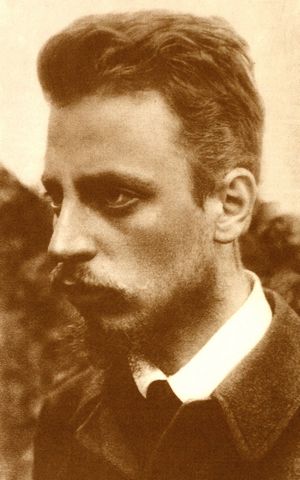Rainer Maria Rilke Frases famosas
Letters to a Young Poet
Citações de amor de Rainer Maria Rilke
“Amor: duas solidões protegendo-se uma à outra.”
der Liebe, die darin besteht, daß zwei Einsamkeiten einander schützen
Briefe an einen jungen Dichter - Página 42, Rainer Maria Rilke, Franz Xaver Kappus - Insel-Verlag, 1932 - 54 páginas
Fonte: RILKE, Rainer Maria. Cartas a um Jovem Poeta. Trad. Paulo Rónai. 10. ed. Porto Alegre: Editora Globo, 1980
Lieben ist zunächst nichts, was aufgehen, hingeben und sich mit einem Zweiten vereinen heißt (denn was wäre eine Vereinigung von Ungeklärtem und Unfertigem, noch Ungeordnetem -?), es ist ein erhabener Anlaß für den einzelnen, zu reifen
Briefe an einen jungen Dichter - Página 39, Rainer Maria Rilke - nsel-Verlag, 1949 - 55 páginas
Rainer Maria Rilke frases e citações
Cartas a Um Jovem Poeta
“Outra coisa é o verdadeiro canto. Um sopro ao nada. Um vôo em Deus. Um vento.”
In Wahrheit singen, ist ein andrer Hauch. Ein Hauch um nichts. Ein Wehn im Gott. Ein Wind.
Die Sonette an Orpheus, Insel-Bücherei Nr. 115 - página iii, de Rainer Maria Rilke, Editora Insel-verlag, 1923, 63 páginas
“Rosa, ó pura contradição, volúpia/ de ser o sono de ninguém sob tantas/ pálpebras.”
Rainer Maria Rilke, citado em "Estrêla da vida inteira: poesias reunidas" - Página 414, Manuel Bandeira - J. Olympio, 1966 - 487 páginas
Uncollected Poems
Rainer Maria Rilke: Frases em inglês
Translated by Stephen Mitchell
Sonnets to Orpheus (1922)
Letter Six (23 December 1903)
Letters to a Young Poet (1934)
Letter to his wife, reprinted in Rilke’s Letters on Cézanne (1952, trans. 1985). (October 21, 1907)
Rilke's Letters
Wie soll ich meine Seele halten, daß
sie nicht an deine rührt? Wie soll ich sie
hinheben über dich zu andern Dingen?
Ach gerne möchte ich sie bei irgendetwas
Verlorenem im Dunkel unterbringen
an einer fremden stillen Stelle, die
nicht weiterschwingt, wenn diene Tiefen schwingen.
Doch alles, was uns anrührt, dich und mich,
nimmt uns zusammen wie ein Bogenstrich,
die aus zwei Saiten eine Stimme zieht.
Auf welches Instrument sind wir gespannt?
Und welcher Geiger hat uns in der Hand?
O süßes Lied.
Liebes-Lied (Love Song) (as translated by Cliff Crego)
Neue Gedichte (New Poems) (1907)
Letter Seven (14 May 1904)
Letters to a Young Poet (1934)
Letter to his wife, reprinted in Rilke’s Letters on Cézanne (1952, trans. 1985). (October 23, 1907)
Rilke's Letters
Translated by Annemarie S. Kidder
Das Stunden-Buch (The Book of Hours) (1905)
Letter Eight (12 August 1904)
Letters to a Young Poet (1934)
Sein Blick ist vom Vorübergehen der Stäbe
so müd geworden, daß er nichts mehr hält.
Ihm ist, als ob es tausend Stäbe gäbe
und hinter tausend Stäben keine Welt.<p>Der weiche Gang geschmeidig starker Schritte,
der sich im allerkleinsten Kreise dreht,
ist wie ein Tanz von Kraft um eine Mitte,
in der betäubt ein großer Wille steht.<p>Nur manchmal schiebt der Vorhang der Pupille
sich lautlos auf—. Dann geht ein Bild hinein,
geht durch der Glieder angespannte Stille—
und hört im Herzen auf zu sein.
As translated by Albert Ernest Flemming
Der Panther (The Panther) (1907)
Translated by Annemarie S. Kidder
In Celebration of Me (1909)
On young couples who have not yet matured enough to recognize and respect each other's solitude
Letter Seven (14 May 1904)
Letters to a Young Poet (1934)
Letter to his wife, reprinted in Rilke’s Letters on Cézanne (1952, trans. 1985). (October 23, 1907)
Rilke's Letters
About Rome.
Letter Five (29 October 1903)
Letters to a Young Poet (1934)
Letter Three (23 April 1903)
Letters to a Young Poet (1934)
Letter Four (16 July 1903)
Letters to a Young Poet (1934)
Letter Ten (26 December 1908)
Letters to a Young Poet (1934)
Letter to his wife, reprinted in Rilke’s Letters on Cézanne (1952, trans. 1985). (June 24, 1907)
Rilke's Letters
Letter One (17 February 1903)
Letters to a Young Poet (1934)
“They more adeptly bend the willow's branches
who have experience of the willow's roots.”
Sonnet 6 (as translated by Edward Snow)
Sonnets to Orpheus (1922)
Herr: es ist Zeit. Der Sommer war sehr groß.
Leg deinen Schatten auf die Sonnenuhren,
und auf den Fluren laß die Winde los.
Herbsttag (Autumn Day) (as translated by Cliff Crego)
Das Buch der Bilder (The Book of Images) (1902)
“Everywhere I am folded, there I am a lie.”
As quoted in News of the Universe : Poems of Twofold Consciousness (1995) by Robert Bly, p. 125
Letter One (17 February 1903)
Letters to a Young Poet (1934)
Original: (de) Mein Gott, fiel es mir mit Ungestüm ein, so bist du also. Es giebt Beweise für deine Existenz. Ich habe sie alle vergessen und habe keinen je verlangt, denn welche unge heuere Verpflichtung läge in deiner Gewißheit. Und doch, nun wird mirs gezeigt.
Fonte: The Notebooks of Malte Laurids Brigge (1910), p. 135
